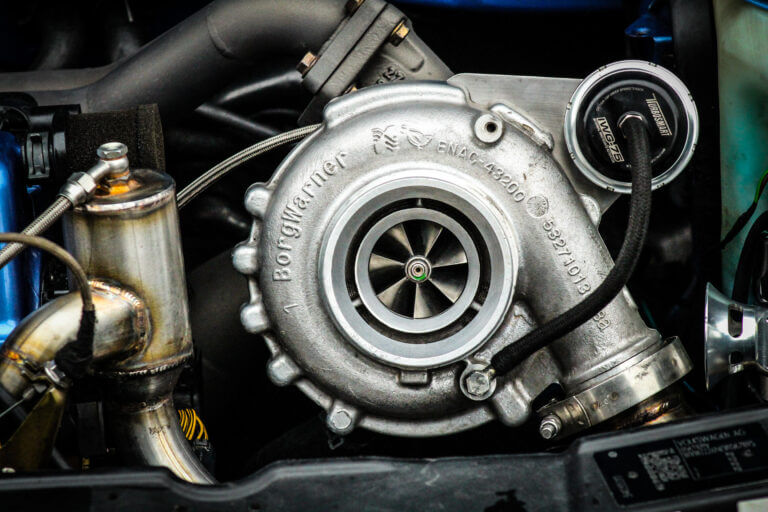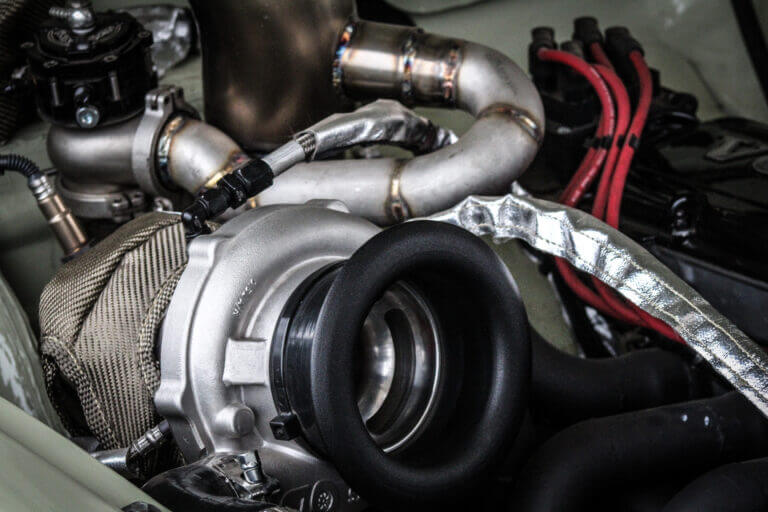Why you should consider turbo reconditioning

In the past decade, the automotive market has undergone substantial transformations to meet stringent economy and CO2 targets set by manufacturers. One effective strategy has been the widespread adoption of turbochargers, which allow for smaller engines to deliver impressive power outputs, thus compensating for reduced engine capacity. This shift has not only boosted engine efficiency but has also spurred an increased demand for services like turbo reconditioning in the UK, as drivers seek to maintain their vehicles' performance and longevity.
Find Turbo Specialists near me.
Post a job for free
The industry
Today It is estimated that nearly half of all new vehicles rolling off a production line somewhere will have a turbo fitted.
In the current industry landscape, it’s estimated that nearly half of all new vehicles being manufactured will be equipped with a turbocharger, reflecting a paradigm shift towards more efficient powertrains. This Toyota GR Yaris is a prime example, with its 1.6 3-cylinder turbocharged engine delivering a robust 260bhp – a testament to turbo optimisation and enhanced engine performance.
This market has now seen a huge rise in the amount of demand for those seeking a Turbo Specialist for a turbo repair or turbo reconditioning. More specialists have entered the market filling this gap with a varying range of skills, equipment, and ability. So it is worth working on what is important and what isn’t.
This trend has led to a burgeoning demand for skilled turbo specialists capable of turbo repair and turbo reconditioning. As the market expands, a diverse array of providers has emerged, each offering different levels of expertise and quality in turbo reconditioning services. It’s crucial to discern the essential qualities of a turbo reconditioning specialist near me to ensure that your vehicle receives the best possible care.
Reconditioning a turbo often presents a more cost effective solution compared to purchasing a new unit. However, with an influx of lower quality parts from various manufacturers, including those from China, the importance of quality craftsmanship cannot be overstated. When maintained correctly, a well reconditioned turbo can serve reliably for the vehicle’s lifespan or up to approximately 150,000 miles, despite the challenging conditions and rigorous demands placed upon it.

The extreme performance of a turbo
To appreciate the harsh conditions that a turbo goes through, here are the fun facts.
Understanding the extreme performance of a turbo begins with recognising the severe conditions it operates under. For instance, the exhaust inlet temperatures of most modern turbochargers can reach around 1050°C, which is almost as hot as lava. Such extreme heat demands that only the highest quality components are used for turbo reconditioning to ensure durability and function. Anything less than the best can result in premature failure.
Turbos can achieve speeds of 280,000 rpm, so it is crucial that assembly and balancing are performed with the highest accuracy and the latest equipment. This underlines the necessity for precise assembly and turbo balancing, utilising the latest technology and equipment. Regular oil changes are crucial too, as they maintain the lubricating film essential for the turbo’s bearing surfaces.
For petrol engines, they can improve the fuel economy by 20 percent, Consequently, there’s a thriving turbo specialist market dedicated to turbo repairs and reconditioning, ensuring these advanced components continue to perform at their best.
What can go wrong
Oil Starvation –When it comes to turbo performance, several issues can lead to trouble. Oil starvation is often the result of using poor quality oil, insufficient oil levels, or neglecting regular oil changes. This can cause significant damage to a turbo’s intricate mechanisms.
Oil contamination – High concentration of carbon from the combustion process
Poor driving habits – Accelerating hard from cold, and lack of oil circulation before setting off, can cause starvation to the bearings.
Prolonged engine idling – can create a vacuum.
Hot Engine shutdown – This can lead to a carbon build-up, also seals can perish under extreme heat soak and eventually fail to lead to bearing failure.
Over speeding – If there is component damage or a leak between the compressor and the engine, then the turbocharger needs to work harder to supply the engine with air. It’s also worth noting that in high altitudes where the oxygen levels are thinner, this same over speeding problem can occur and the turbo is having to work harder.
Incorrect rebuilds or reconditioning – Caused by inferior parts, improper calibration, incorrect balancing.
Additionally, incorrect turbo reconditioning, which could involve the use of subpar parts, improper calibration, or inaccurate balancing, can further exacerbate these problems. It’s vital to entrust your turbo to a qualified turbo specialist who uses quality turbo reconditioning parts and follows precise turbo refurbishment practices to avoid such pitfalls.

What is involved in reconditioning?
The process of turbo reconditioning is intricate and demands a high level of expertise. Only those with the proper training and turbo reconditioning equipment should undertake this specialised task.
The reconditioning process begins with a thorough disassembly of the turbocharger, followed by a meticulous cleaning and inspection to identify any signs of turbo failure or damaged components.
Once the assessment is complete, replacement of the faulty parts is essential. These components could range from the smallest seals to the central turbine shaft.
The reassembly is a delicate procedure, as the turbo must be balanced precisely to avoid any turbo bearing failure. This balance is not just a one step process, it involves multiple stages of assembly to ensure that each turbo meets stringent turbo reconditioning standards.
Balancing a turbo
The whole unit is then meticulously reassembled and rebalanced, a critical process for which specialists like those at Turbo Technics provide industry-leading equipment and expertise.
Balancing a turbo is one of the most important tasks because of the high speeds it performs at, using the right equipment, turbo specialists can expect to achieve balancing within 0.001g of manufacturer tolerance.
The balancing is broken down into two parts, high speed, and low-speed balancing. High-speed balancing is carried out on highly sensitive equipment which is oil fed and uses compressed air to get it up to the required speed where vibration sensors will take a reading.
Adjustments are then made to the compressor nose or nut to trim it.
Low-speed balancing is performed by pre-oiling the turbine shaft and mounting is onto a conventional balancing machine, which is spun at relatively low speed by either an air compressor or belt.
Measurements are then taken from both ends of the assembly.
If these steps are avoided and the turbo is finished unbalanced then this could lead to oil leaks from each end of the bearing housing, or even cause a high-pitched screaming from the vibration.
It is finally then performance tested on the bench where the input and output measurements are recorded before another quality control check takes place ready to send to the customer.
Neglecting proper balancing can have grave consequences, highlighting the necessity of using the correct turbo reconditioning equipment and procedures as championed by industry experts, as detailed by experts from Hines Industries and CIMAT. Following reassembly, each turbo is performance tested to ensure optimal operation, a step where the precision of Hofmann balancing machines can make a critical difference
Why you should use a reputable specialist
Hopefully, by this point, you have a little more mechanical sympathy about how turbochargers work and how technically sensitive they can be.
It’s not unusual to find specialists who only deal with turbo reconditioning as it is a very specialist component. It not only requires a detailed amount of knowledge on the subject but it also requires a dedicated team who can operate the sensitive equipment required for assembling and testing.
It shouldn’t be overlooked.
Conclusion
Ensuring your turbo is assembled with high-quality components and accurately balanced on the right equipment is key to its longevity. You can confidently expect it to last for the life span of your vehicle. Most reputable turbo specialists near me stand by their work with a 12-month warranty, which is a mark of quality and reliability. If this assurance isn’t offered, it’s advisable to seek clarification.
Turbo reconditioning is not just a recommended maintenance procedure but also a cost effective alternative to purchasing a new turbo potentially saving you up to 65% compared to the turbo replacement cost. Due diligence in choosing the right service provider will help you avoid inferior quality work.
Keep in mind, a turbocharger in motion at speeds of up to 280,000 rpm must be flawlessly reconditioned and set up to prevent rapid failure. Opting for turbo reconditioning is primarily about cost efficiency, it’s an investment in the performance and durability of your vehicle. Therefore, selecting a specialist based on price alone can be risky. Ensure you invest in a turbo reconditioning service that offers not just affordability but also guarantees the technical excellence that will stand the test of time.
In most cases the whole point to recondition your turbocharger is to save on the cost of replacing the whole unit, so don’t scrimp if your find a “cheap” specialist as you could end up with the same problems in the near future.
Find turbo reconditioning near me
Post a job for free
Automotive Wheel Refurbishment
Automotive Upholstery and trimming
Automotive Fabricator
Automotive Suspension Alignment
Automotive Carbon Composite
Automotive Coach Builder
Race car Data Engineer
Engine Builder
Automotive Fibreglass Composite
Automotive Dyno Technician
Automotive Gearbox Specialist
Automotive Transportation
Automotive Electrician
Automotive Turbo Specialist